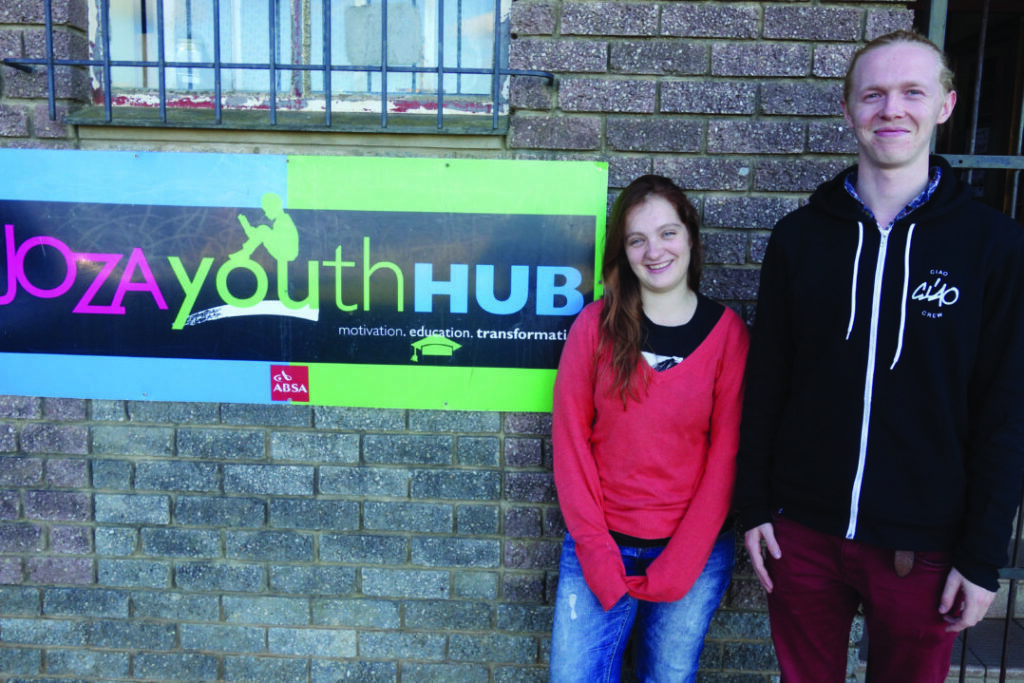
By Chiara Brendel and Lukas Hüneke
The awarenet programme, which runs IT classes with learners from several Grahamstown schools, each year receives two volunteers from Germany. They work full time for the programme an entire year. Below are their impressions after having spent eight months in Grahamstown.
They say you can’t really get a feeling for a country until you’ve been there, until you speak to the people, see their land and breathe their air. They say you only know the country once you’ve lived there, been a part of it and built a life there.
So that’s what we wanted to do by coming to South Africa. When we arrived, a year felt like a lifetime and we thought that after 12 months, we would know this country and its people, its beauty and its problems. But then again we haven’t even been to the Albany museum.
People keep asking why we chose South Africa.
Looking back, it seems impossible to reenact how we came to that decision. The reasons for taking a gap year in general were the usual ones: time for ourselves, to grow and develop our characters while learning about other cultures and countries and improve our English.
By going to South Africa, our mothers might have dreaded that we were going to be eaten by lions – but we felt that going away as far possible was the best way we could take advantage of the new freedom we had won after finishing high school.
Well, it’s not all that adventurous after all. There is a programme called weltwärts (literally worldwards) that sends about 3 700 young Germans to countries in Asia, South America, Africa and eastern Europe to work with charitable projects every year. This programme is funded by the German government and comes with preparation and support during the year, in form of a local mentor and seminars.
Because the short descriptions of potential volunteer workplaces on the internet don’t give you a good impression of what you’re actually going to do, we were lucky to have an organisation that knew better where our skills and interests would be of use. That’s how we became volunteers on the awarenet programme run by the Village Scribe Association here in Grahamstown.
Our work here is rich in variety and interesting. We have a lot of freedom in choosing what we want to do, especially when it comes to the projects we do with our learners, but that also means that it’s our responsibility to make it work.
However, the responsibility makes us feel like a real part of the organisation even though we’re not as experienced as our colleagues. We have a lot of different tasks: we help with the fundraising, technical support, public relations and documentation. Our highlights certainly are the training sessions with primary school learners from different schools in Joza and Fingo. The sessions can be really exhausting and overwhelming but also very rewarding.
Another interesting aspect of our work is the cooperation with Rhodes students, mostly through the Community Engagement programme. The students who come once a week to assist us with the sessions always bring fresh air and new ideas to the organisation and the classroom.
It’s also really quite interesting to change your perspective in the classroom in such a short time. Just a year ago we attended Grade 12 and were the ones forced to sit still and listen; now we’re the ones depending on our learners’ motivation and respect.
So how is South Africa different from Germany?
That is another question we have been asked countless times by now. And how does it compare to your expectations?
Honestly, we were not expecting our everyday life in South Africa to feel as similar to our everyday life in Germany as it does. The main difference has actually been moving out of our parents’ homes.
The contrast which surprised us was not the one between South Africa and Germany, but rather the one within the country itself. Working at schools in the township during the day and walking past a private school on the way back home is a striking example of the contrasts we experience in South Africa every day.
But the more time we spent in the schools in Joza, the more we realised how different the realities, problems and needs of different parts and groups of South African society are. The protests at Rhodes for free tertiary education feel far away from the problems our learners in primary schools are facing every day.
We are not sure if our view on South Africa has become more or less differentiated, staying mostly in the same town all the time. All the people we spoke to during the last months are just a small part of a socially and culturally diverse society.
In South Africa, we are challenged to understand opinions coming from a variety of perspectives, much more than we are in Germany. The spectrum of political, economic and social views in our home country is much narrower due to its homogeneous culture and single language.
Twelve months of volunteering seem daunting at first, but it probably does not matter how long you stay, you will feel like you have just scratched the surface of the society into which you tried to immerse yourself.


